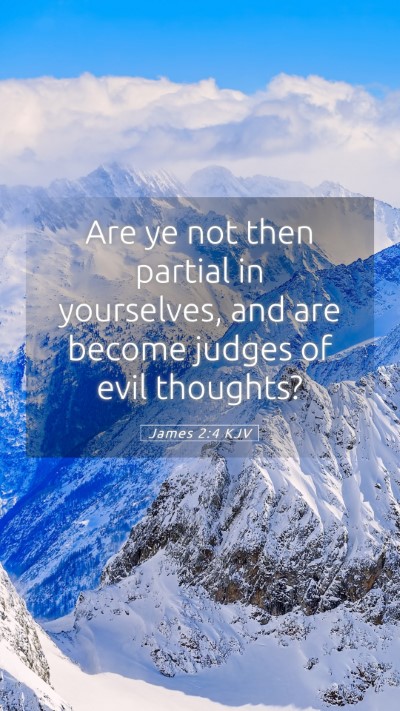Old Testament
Genesis Exodus Leviticus Numbers Deuteronomy Joshua Judges Ruth 1 Samuel 2 Samuel 1 Kings 2 Kings 1 Chronicles 2 Chronicles Ezra Nehemiah Esther Job Psalms Proverbs Ecclesiastes Song of Solomon Isaiah Jeremiah Lamentations Ezekiel Daniel Hosea Joel Amos Obadiah Jonah Micah Nahum Habakkuk Zephaniah Haggai Zechariah MalachiJames 2:4 Meaning
What is the meaning of James 2:4?
Are ye not then partial in yourselves, and are become judges of evil thoughts?
James 2:4 Bible Verse Meaning
Understanding James 2:4
James 2:4 states, "Are ye not then partial in yourselves, and are become judges of evil thoughts?" This verse emphasizes the sinfulness of partiality and the inward judgments that can lead to discrimination among people within the Christian community.
Bible Verse Meaning
In this powerful passage, James confronts the issue of favoritism—specifically, the tendency to favor the wealthy over the poor. He challenges the believers to consider their actions and the motivations behind them. The verse calls into question the moral integrity of those who show bias, thereby forcing a reflection on one's own heart and motives.
Commentary from Public Domain Commentaries
- Matthew Henry: Henry suggests that this partiality is rooted in evil thoughts, which reflect a deeper moral failing. He argues that showing favoritism based on outward appearances contradicts the very essence of faith. This principle underscores the necessity of genuine love for all individuals, regardless of their status or material wealth.
- Albert Barnes: Barnes explains that the term "judges of evil thoughts" implies a conscious decision to judge others based on superficial criteria. He emphasizes the severity of such behavior, warning that if one indulges in such judgments, they stray far from Christ’s teachings of equality and love. Christians are called to avoid hypocrisy and to act with true righteousness.
- Adam Clarke: Clarke presents a view that addresses both the spiritual and social implications of partiality. He notes that favoritism demonstrates a lack of proper discernment and an inclination towards worldliness. Clarke's analysis suggests that believers need to consistently evaluate their actions, ensuring they align with the principles of justice and equity as taught by Scripture.
Application of James 2:4
This verse is a call to self-examination. Believers are encouraged to assess their attitudes and behaviors toward others. The teachings encapsulated in James 2:4 can be applied in numerous contexts, such as:
- Church settings where biases may arise.
- Day-to-day interactions in the workplace and community.
- Personal relationships where preconceived notions may cloud judgment.
Cross References
- Leviticus 19:15 - A call to justice without favoritism.
- Proverbs 24:23 - The need for impartiality in judgment.
- Galatians 3:28 - The removal of divisions based on social status.
Conclusion
James 2:4 serves as a profound admonition against favoritism, inviting Christians to introspect on their motivations and actions. The insights drawn from this verse encourage believers to foster a community grounded in equality, justice, and genuine love. As we engage in Bible study, we must remember that true faith expresses itself through how we treat others, urging us to overcome superficial biases and embrace the heart of God’s commandments.
Further Study Options
For those seeking deeper understanding and Bible study insights, consider joining bible study groups or utilizing bible study tools that focus on the themes of justice, equality, and community in Scripture. Engaging with resources such as bible study guides and bible study materials can enrich your journey towards understanding Scripture more profoundly.


